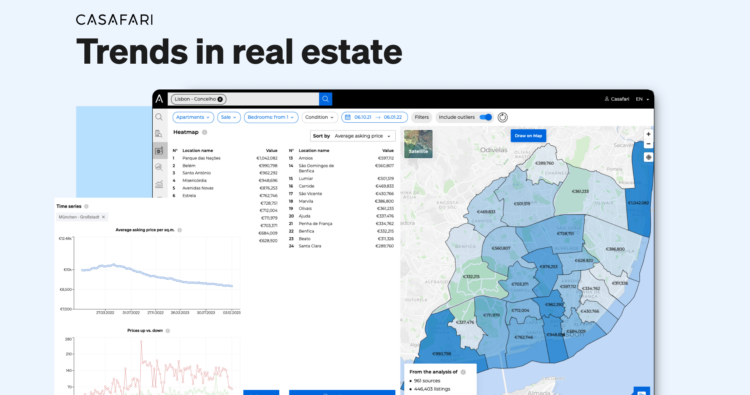Finding a good tenant is crucial to ensure stability during the tenancy agreement. It helps landlords avoid having to pay for the bills while the property is empty and having to repair damage done by inappropriate behaviour.
But what are considered the good tenant’s qualities? Or, even better, what should an estate agent have in mind when searching for these people? Here are some thoughts and tips about it.
What makes a good tenant?
A well behaved resident, a good neighbour, an effective communicator… What traits make a good tenant? Here’s a short list of good tenant qualities that every estate agent should look for.
Is willing to provide information
“If you have nothing to hide, you have nothing to fear” or “out of debt, out of danger”, you can pick your favourite saying. The fact is that people willing to provide information about themselves, their career and their habitational history probably have everything they need to prove they are a desirable tenant. Which leads us to…
Has a positive rental history
Yes, looking at the past is important because a good tenant respects the tenancy agreement. This means:
- Paying rent timely;
- Asking before making changes to the property;
- Letting the homeowner know a friend, a family member or a partner is going to live in the property as well;
- Communicating previously, as established in the tenancy agreement, when they want to move out.
But their duties don’t end there. They also must be respectful to other people living in the building, keep the place clean, take care of the property adequately and allow the homeowner, or professionals hired by them, to enter the property (agreeing on a date and time, of course) when fixes are needed.
Someone that checked all these boxes in their previous experiences renting should qualify as a good tenant for your client as well.
Lacks criminal convictions
Ideally, a good tenant is someone that abides by the law, especially because they will have to respect a tenancy contract, but also because you want to make sure this person is not dangerous to the property or its neighbours.
But, when checking for a criminal record, an estate agent must be careful not to prejudge the person or the situation they got involved in.
One thing to consider is when did the offense happen and how often. For sure, a crime committed decades ago and with no recurrence is less of a problem then a recent situation or one that keeps repeating itself.
Another point to think about is the seriousness of the offense: robbing a bank is something much more impactful than stealing a lollipop from a grocery store as a teenager, for instance.
After all, what you want to answer is if this behaviour:
- Puts your property at risk,
- Puts the neighbours at risk,
- Puts your tenant’s ability to pay the rent at risk.
If your answer is no, then there should be no reason to worry about.
Has no previous evictions
Evictions are a long and expensive process. More often than not, while the eviction is going on, the landlord is not receiving the rent properly and even has to pay for legal representation to make sure the tenant is removed from the property. So, this is definitely a situation to be avoided.
If an applicant to rent the property of your client has no record of being evicted, this is a good starting point.
Counts with good credit history
If an applicant has always paid their rent, bills, credit cards, tuition fees and other financial obligations in time, these facts are part of the answer to the question “what makes a good tenant”.
Communicates openly and honestly with the landlord or the estate agent
One of the good tenant qualities is being able to communicate easily with the estate agent or the homeowner, letting them know as soon as possible when something unexpected happens with the property or when a new situation presents itself.
Imagine the tenant has no pets, for instance. Even if the contract allows them to have one, it’s good practice to let the estate agent or homeowner know if an animal is now living in the property.
Is able to offer guarantees to the homeowner
There are two main worries that landlords have: they want to make sure the tenant pays the rent and takes good care of the property. A good tenant should be able to understand that and be willing to offer guarantees of their goodwill.
Besides the collateral deposited in the beginning of the tenancy contract to cover possible future repairs when the tenant moves out, a good tenant may also be willing to negotiate other forms of providing financial security to the landlord. This can be done by paying upfront a few months of rent, hiring rent insurance or by presenting a guarantor.
Is interested in a long-term deal
Tenants that keep moving from one property to the next leave landlords in a constant state of alert because they are always worried about the next time they have to find someone to occupy the property.
So, ideally, one of the good tenant qualities is being interested in staying in the property for longer, establishing a long-term and stable relationship with the homeowner and providing a certain level of security to them.
How to find a good tenant
1. Start by looking for the most complete applications
A good tenant, willing to collaborate with the renting process, offers all the information needed about themselves and ways of verifying them, whether it’s with links or documents. The more complete the application, the more they show their goodwill and interest in the property.
2. Run a behavioural check
Get in touch with the applicant’s previous landlords to ask if the person took proper care of the property, if the rent payment was timely or if there was any kind of trouble with him, either with the homeowner or with neighbours. Also, try to understand how they managed conflicts: were they a good tenant, willing to cooperate and find a good solution for everyone, or were they hard to deal with?
Another possibility is to talk to their past neighbours, see what they have to say about living close to the applicant before coming to your own conclusions.
3. Search for past evictions
Try to find out if there are any past lawsuits in the sense of evicting the potential tenant. And, before jumping into conclusions, if you find any, you might ask both the previous landlord and the applicant about it.
If a person has a good history with many homeowners and one single eviction, one specific problem might have occurred, but nothing that states how they behave as a tenant.
4. Inspect their professional and financial situation
Start by analysing their professional status and income
To make sure the applicant has the potential to be a good tenant, financially speaking, you can ask for the applicant’s previous paychecks. That way the estate agent will know if they have a stable income that’s compatible with the rent.
You should also have in mind that different cities have different policies when it comes to how much of the income can be attributed to rent, since some places are much more affordable than others or may have higher average salaries. And, in more expensive cities, it’s common that tenants join their income with those of their partners, friends or family members to reach the amount needed. So, your judgement shouldn’t be made solely based on one single salary.
Another possibility, especially with potential tenants that were recently hired or that are freelancers, is asking for official income tax declaration for the previous years. These documents will help the estate agent understand the average annual income and see there is some sort of financial stability.
Then, audit their credit score and history
If possible, try to also find out the credit score of the applicant: if it’s good, it means this person is used to paying what they owe timely, not leaving any debts behind. Try to see as well if the potential tenant already has other sources of debt, such as large sums in fundings, that takes up most of their income, harming their chances of paying rent.
If needed, proceed to a professional check
If you’re unsure about the professional stability of your potential tenant, you can ask them for proof of employment or even check on social media to be sure they are really employed where they are saying so.
What a landlord can’t do when in search for a good tenant
In the United Kingdom, it is forbidden to harass or discriminate tenants based on criteria such as:
- Race and color
- National origin
- Gender or sexuality
- Disabilities
- Religion
- Marital status
So, be careful: ask only for those documents and information that are directly related to their ability to live in the place you wish to rent.
Photo by Maria Ziegler on Unsplash






